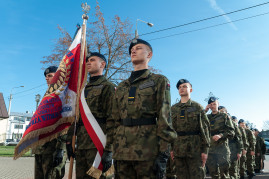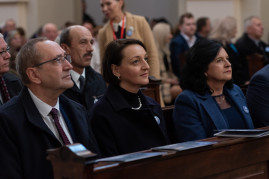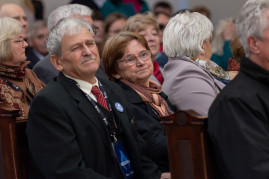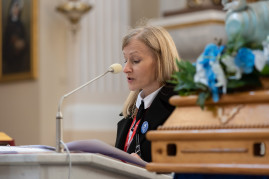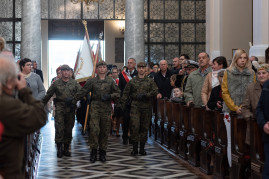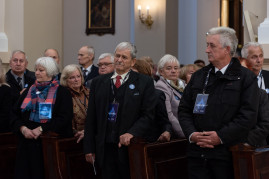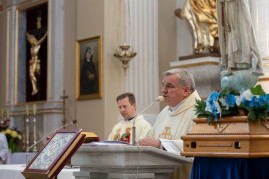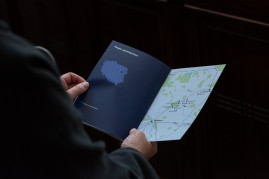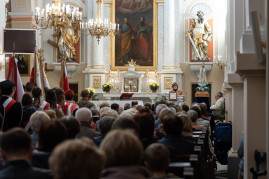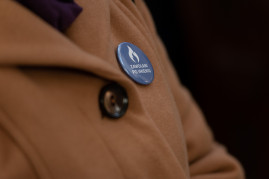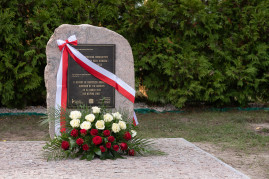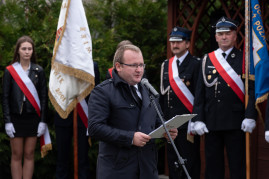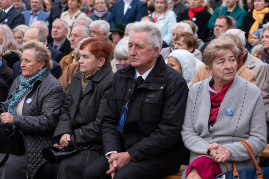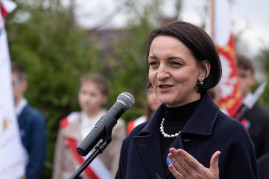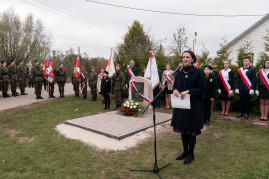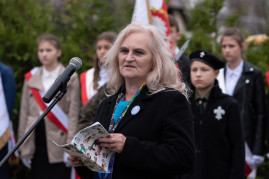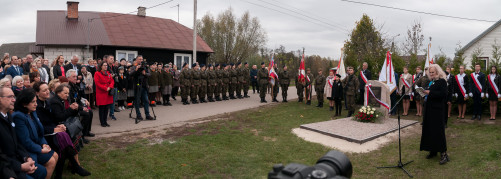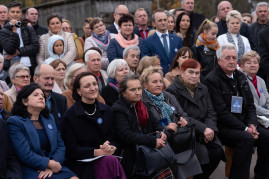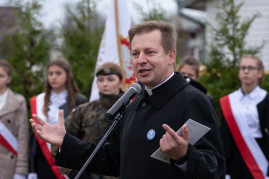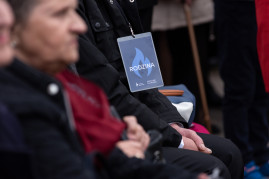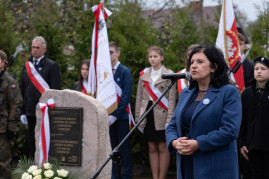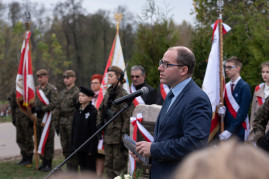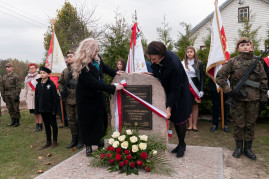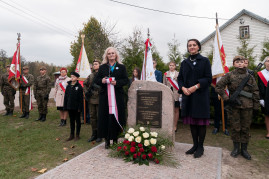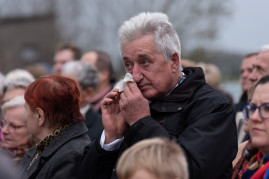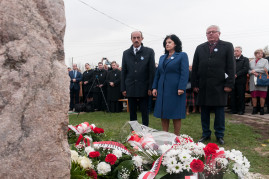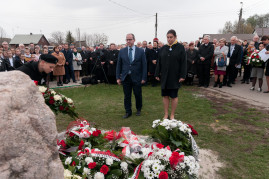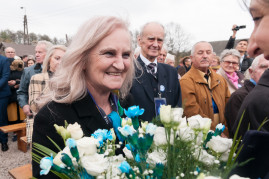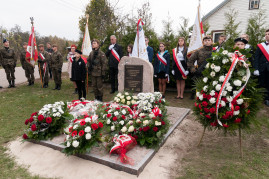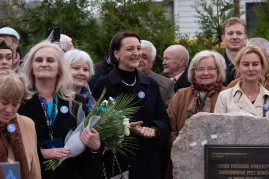Tribute to Franciszek Andrzejczyk - Instytut Pileckiego
Tribute to Franciszek Andrzejczyk
The “Called by Name” project is gaining momentum! As many as 65 people from the family of Franciszek Andrzejczyk came to Czyżew to honor the memory of their father, grandfather, and great-grandfather.
“Our family is full of admiration for our grandfather’s decision. For us, Franciszek is a real, unembellished hero. He sealed his love of God and his fellow man with his life, paying the highest price for doing good,” said Franciszek’s granddaughter, Janina Janczarska, during the ceremony commemorating her grandfather’s heroic deed. Her family had waited 70 years for this day.
During the German occupation, Franciszek and his wife lived with their six children in the village of Czyżew-Sutki. When the Germans began to liquidate the ghetto in nearby Czyżew at the beginning of November 1942, the Andrzejczyks took in as many as 18 Jews looking for help – men, women, and children. Together, they built two hiding places: one under the house floor, and one in a nearby dugout. The winter months that followed were quite a challenge for the family. Fear of being denounced mingled with their concern for the over dozen people, who could only leave their shelter at night. It is hard to imagine how much effort it must have taken to provide them with basic necessities. “A picture of incredible effort on the part of the Polish family emerges from the testimonies preserved in documents,” said Dr. Wojciech Kozłowski, Director of the Pilecki Institute. “Edward, 25 at the time, recalled taking away pails of sand when building the hiding place under the floor. Jadwiga, who was 15 at the time, spoke of cooking in enormous pots, baking numerous loaves of bread and taking away buckets with waste. If not for the threat of death at the hands of the Germans that they all faced, one might have thought that the Andrzejczyks were simply running a guesthouse.”
In the morning of 20 March 1943, gendarmes arrived at the Andrzejczyks’ farm to conduct a search. They demanded that Franciszek show them the place where the Jews were hiding. When he denied that he was sheltering anyone, the Germans began a search. They took note of an atypical sound made by the floor of the dugout. Underneath, they found a hiding place with three men inside. Angered by the discovery, they severely beat and then shot Franciszek Andrzejczyk. They also killed the men they dragged out of hiding. They then searched the house and found the remaining people, whom they tied with rope and took away to Szulborz to be executed.
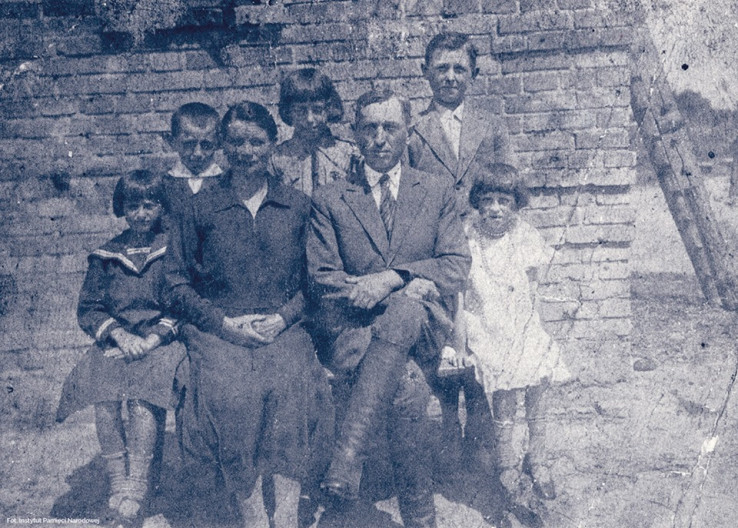
Years passed. Only Franciszek’s loved ones and neighbors remembered the tragedy. This is why when the Pilecki Institute decided to publicize the story, the whole family reacted with great enthusiasm and engagement.
The ceremony commemorating the murdered man as well as the courage and steadfastness of his wife and children brought together several hundred people: representatives of the government, the local authorities, students from the Witold Pilecki Vocational School in Ciechanowiec as well as residents of nearby villages. Also assisting during the event were soldiers of the Territorial Defense Forces. Their presence had a symbolic meaning: in the world of today, thanks to their presence, we can feel safe.
After mass at the Czyżew church, a memorial plaque was unveiled on a stone, with an inscription in Polish and English. Before the wreaths and flowers were laid, a minute of silence was observed to honor the memory of Franciszek Andrzejczyk and of the Jews that his family had been sheltering.
“The assistance offered to Jews during the German occupation is one of the most admirable chapters in Polish history,” wrote Prime Minister Mateusz Morawiecki in a letter to those taking part in the ceremony. He underlined that Franciszek Andrzejczyk had paid for “an act of human solidarity” with his life. He also added that “the plaque dedicated to him serves as a poignant testimony of saving that which is most beautiful in human nature during a time of contempt.”
The Pilecki Institute project not only honors the memory of those who helped Jews in hiding. An important element of the project is also integrating the local community around events that belong to its shared history. This was noticed by Prof. Magdalena Gawin, Deputy Minister of Culture and National Heritage, who initiated the “Called by Name” project: “As the local community, you are the custodians of this knowledge, custodians of the memory of the Andrzejczyks’ magnificent, patriotic, religious attitude.”
Prof. Magdalena Gawin also announced that a reunion of the families of all of the commemorated heroes will be held on 24 November 2019.
